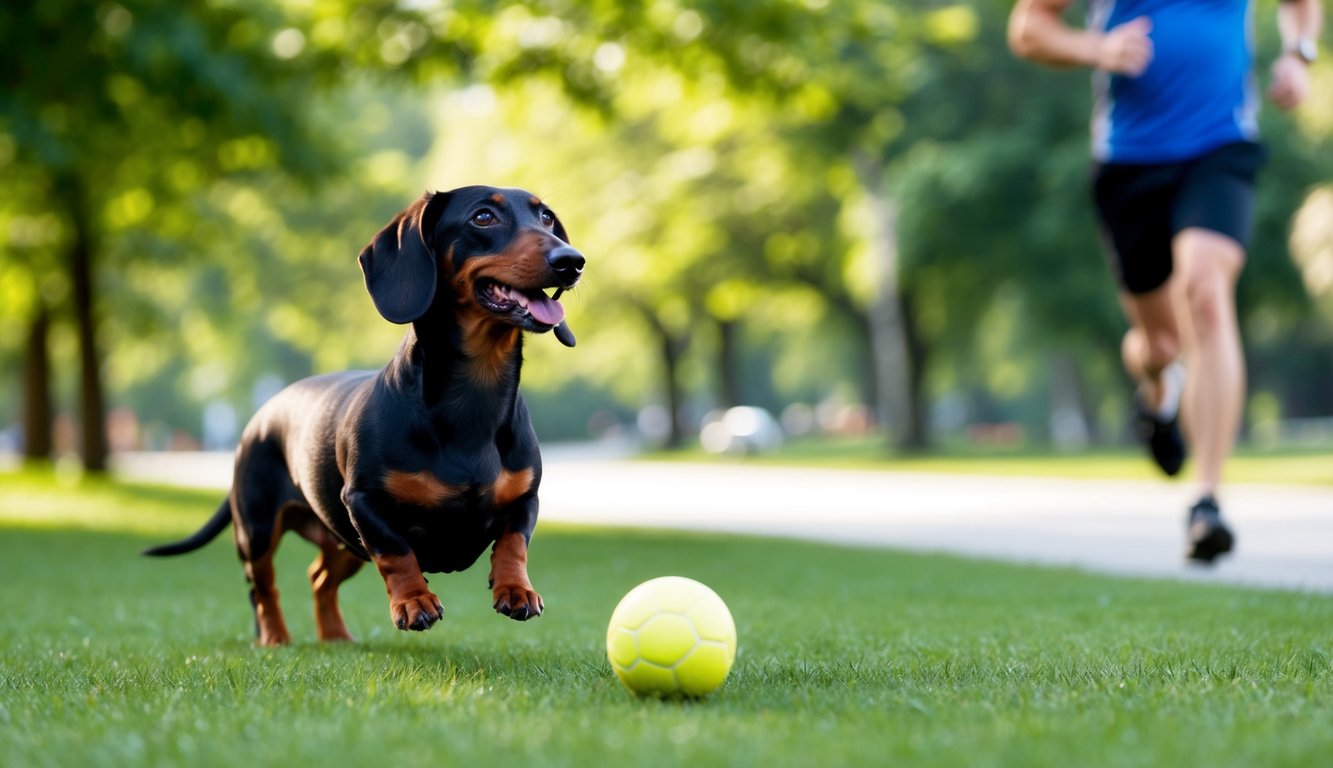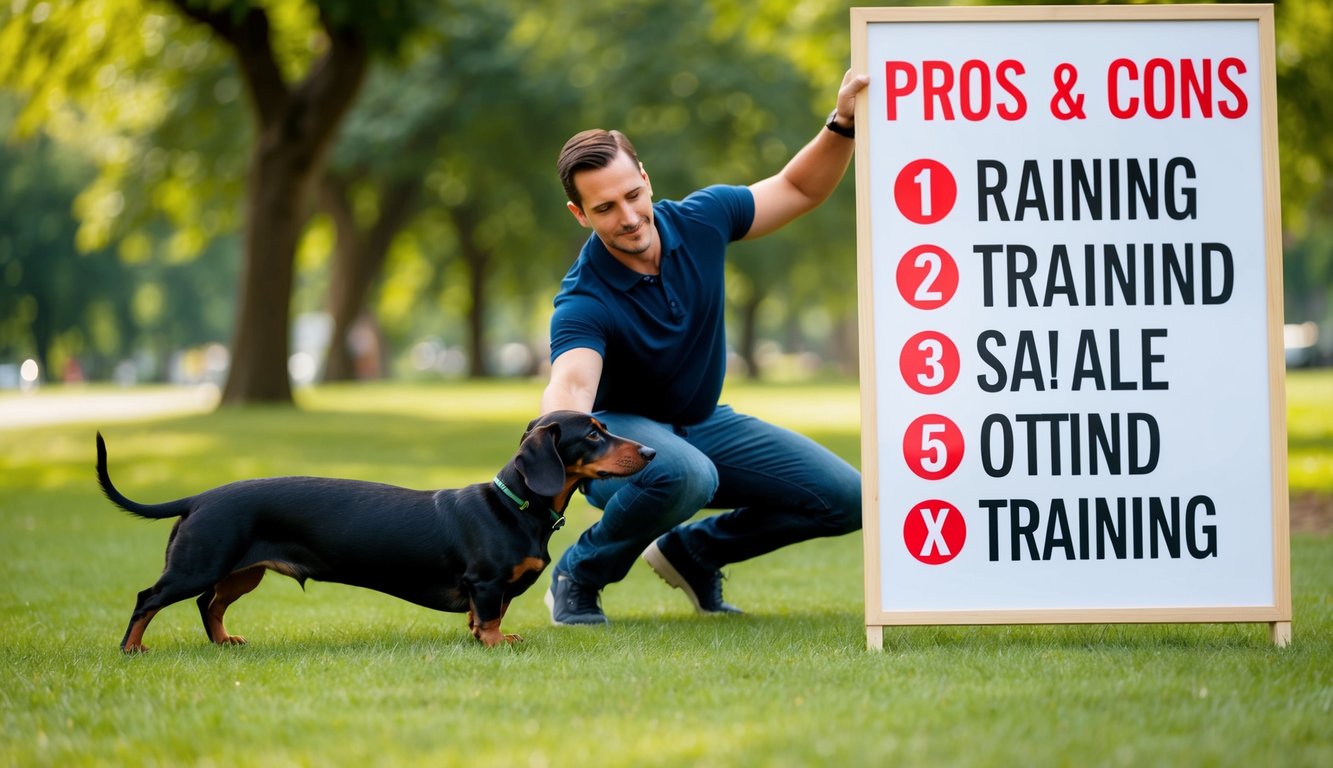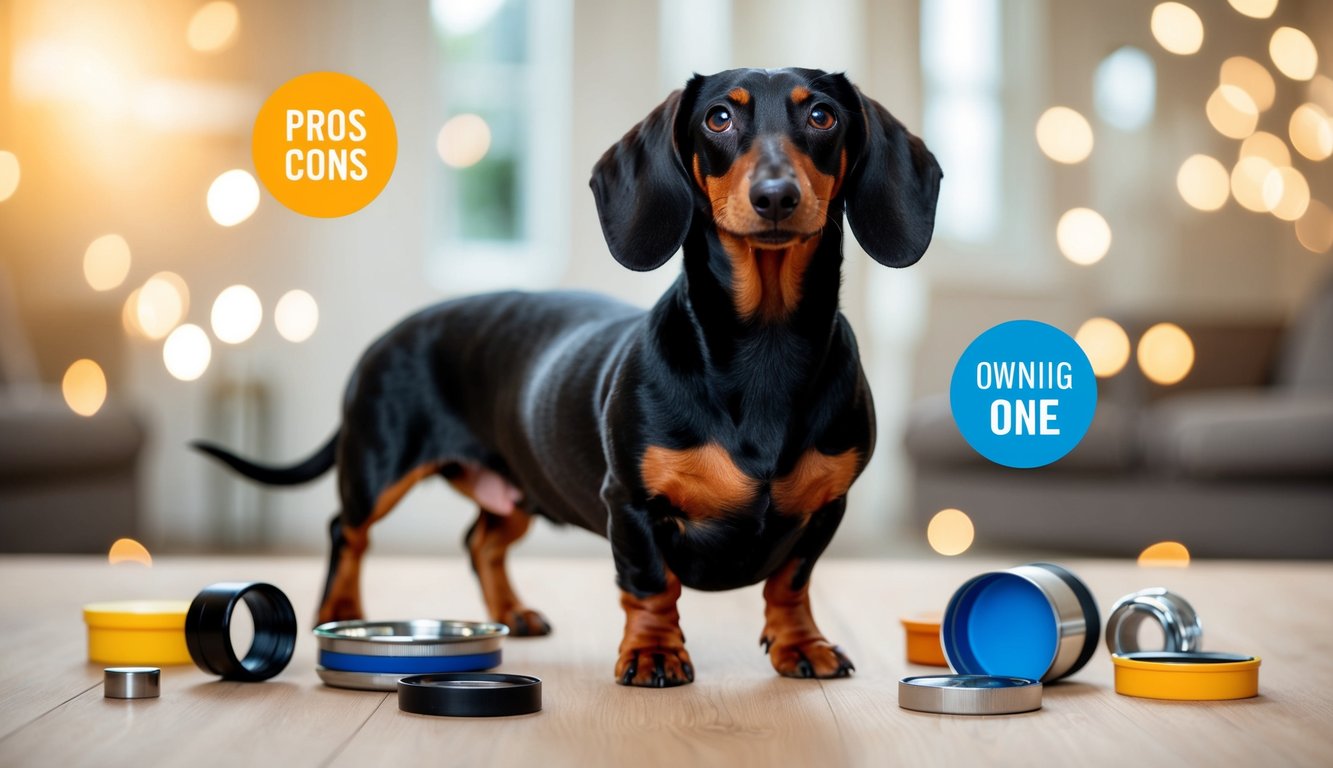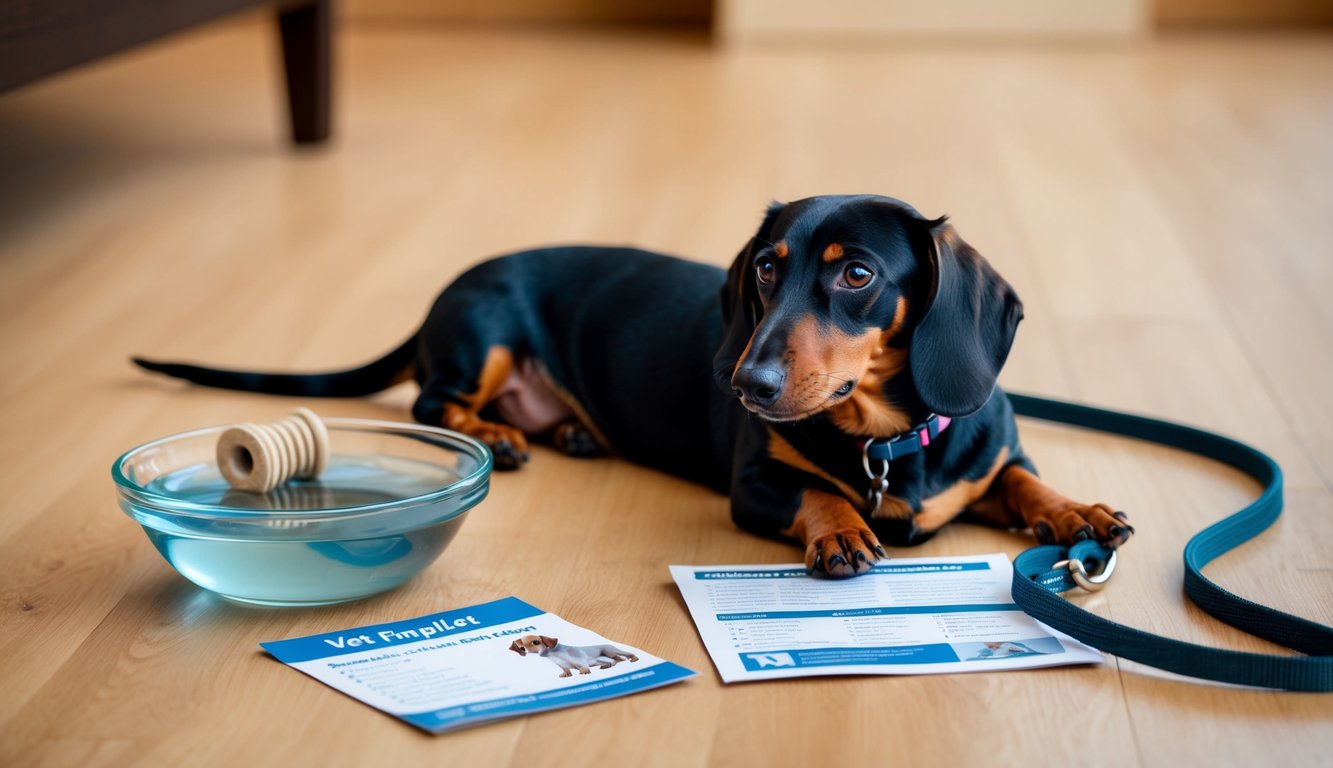Thinking about getting a Dachshund? I know how exciting it can be to bring a new furry friend into your life. These little dogs, also known as wiener dogs, are cute and full of personality. But before you make a decision, it’s important to think about both the good and not-so-good parts of owning one.
Dachshunds can be great pets for the right person, but they’re not for everyone. I’ve put together a list of 15 pros and cons to help you figure out if a Dachshund is the right fit for you. From their loyal and fun-loving nature to their tendency to be stubborn at times, there’s a lot to consider. Let’s take a closer look at what it’s really like to have one of these adorable pups in your life.
1) Charming Personality
Dachshunds are known for their playful and affectionate nature. I’ve found these little dogs to be full of personality, often described as spunky and clever. They never fail to bring a smile to my face with their antics.
In my experience, Dachshunds are curious and lively. They love to be involved in everything that’s happening around them. I’ve noticed they have a great sense of humor and enjoy playing games with their human family members.
These little clowns are always ready to entertain. I’ve seen them perform the silliest tricks just to get attention or a treat. Their charming personalities make them excellent companions for people of all ages.
I’ve found that Dachshunds are incredibly loyal and form strong bonds with their families. They seem to believe that sleeping under the bedcovers is their birthright, which I find endearing.
Their brave and sometimes stubborn nature adds to their charm. I’ve watched my Dachshund stand up to much larger dogs without a second thought. This confidence, combined with their playful spirit, makes them truly irresistible pets.
2) Compact Size for Apartments
Dachshunds are perfect for apartment living! Their small size makes them ideal for cozy spaces. I love how these little pups can make themselves at home in even the tiniest apartments.
Dachshunds adapt well to apartment living due to their compact build. I find it amazing that they don’t need a huge house or yard to be happy. They’re content with a small living area as long as they get enough exercise and attention.
I’ve noticed that their size also makes them easy to transport. Whether I’m taking my Dachshund to the vet or on a weekend trip, they fit comfortably in a small carrier or even on my lap in the car.
Another great thing about their size is that they don’t take up much space on the couch or bed. I love cuddling with my Dachshund without feeling crowded. They’re the perfect size for snuggling!
While they may be small, Dachshunds still have big personalities. I’m always impressed by how much character they pack into such a tiny body. They prove that good things really do come in small packages!
3) Can Be Stubborn

Dachshunds are known for their stubborn streak, and I can tell you from experience that it’s no joke! These little dogs have minds of their own and aren’t afraid to show it.
When my dachshund decides he doesn’t want to do something, it can be quite a challenge to change his mind. Training can be tough with these strong-willed pups.
I’ve found that housebreaking a dachshund takes extra patience and consistency. They’re not always quick to pick up on potty training, which means more accidents to clean up.
Sometimes, my dachshund will suddenly stop on walks and refuse to budge. It’s like he’s planted his paws firmly in the ground! I’ve learned to bring treats along to coax him into moving.
Their stubbornness can make obedience training a bit tricky. I’ve had to get creative with positive reinforcement to keep my dachshund engaged and willing to learn.
Despite the challenges, I find their determined personalities endearing. It’s part of what makes dachshunds unique and lovable. With patience and understanding, we’ve found ways to work through the stubborn moments together.
4) Loyal Companions

Dachshunds are known for their incredible loyalty. I’ve seen firsthand how these little dogs form strong bonds with their owners. They truly become a part of the family.
In my experience, a dachshund will stick by your side through thick and thin. They love nothing more than cuddling up with their humans. Whether I’m having a great day or feeling down, my dachshund is always there to offer comfort and support.
I’ve noticed that dachshunds often pick a favorite person in the household. They shower that person with extra affection and attention. It’s heartwarming to see how devoted they can be.
One thing I love about dachshunds is how in tune they are with their owner’s emotions. They seem to sense when I need cheering up and are quick to offer doggy kisses and snuggles.
While their loyalty is admirable, it can sometimes lead to separation anxiety. I’ve found that my dachshund gets upset when left alone for too long. It’s important to help them feel secure and teach them to be independent too.
5) Daily Exercise Needs

Dachshunds have moderate exercise needs that are easy to meet. I find that a daily walk of about 30 minutes is enough to keep my wiener dog happy and healthy.
These little pups also love playtime. I enjoy tossing a ball for my Dachshund in the backyard or playing tug-of-war indoors. It’s a great way to bond and burn off some energy.
Dachshunds are social animals and need daily mental stimulation too. I like to use puzzle toys or hide treats around the house to keep my pup entertained.
It’s important not to overdo it with exercise, though. Dachshunds have long backs that can be prone to injury. I’m always careful to avoid activities that put too much strain on my dog’s spine.
I’ve found that splitting exercise into shorter sessions throughout the day works well. A quick walk in the morning and some playtime in the evening keeps my Dachshund content.
Remember, every dog is different. I pay attention to my Dachshund’s energy levels and adjust our activities accordingly. This helps me ensure they’re getting just the right amount of exercise each day.
6) Prone to Back Issues

Dachshunds are adorable, but I have to be honest about their health risks. Their long, low bodies make them susceptible to back problems, especially intervertebral disc disease.
I’ve seen how this can affect a dachshund’s quality of life. It’s heartbreaking to watch a once-active pup struggle with mobility or even face paralysis.
As an owner, I need to be extra careful. I always lift my dachshund properly, supporting both the chest and rear. I also make sure they don’t jump off furniture or climb stairs too often.
Regular vet check-ups are a must. I keep an eye out for signs of back pain, like reluctance to move or a hunched posture. Early detection can make a big difference in treatment outcomes.
I’ve found that maintaining a healthy weight is crucial. Excess pounds put more strain on their delicate spine. A balanced diet and gentle exercise help keep my dachshund fit and reduce the risk of back issues.
While these precautions don’t guarantee a problem-free life, they’ve helped me minimize the chances of serious back troubles for my furry friend. It’s a responsibility I take seriously as a dachshund owner.
7) Good Watchdogs
Dachshunds make great watchdogs, and I’ve found this to be one of their best qualities. These little pups have a big bark that can alert you to any potential intruders or unfamiliar sounds.
I love how attentive my Dachshund is to his surroundings. He’s always on the lookout and ready to let me know if something seems off. Their watchdog abilities make them an excellent choice for families wanting a small but protective pet.
In my experience, Dachshunds are naturally curious and territorial. They take their job of guarding the home seriously, even if they’re small in size. I’ve noticed my little guy gets especially alert when he hears unfamiliar noises outside.
One thing I really appreciate is that while they’re quick to bark at potential threats, they’re not usually aggressive. My Dachshund just wants to let me know something’s up, then leaves it to me to handle the situation.
It’s worth noting that their alertness can sometimes lead to excessive barking. I’ve had to work on training my pup to quiet down when I tell him it’s okay. But overall, I find their watchdog instincts to be more of a benefit than a drawback.
8) Requires Regular Training

Dachshunds are smart dogs, but they can be stubborn. I’ve found that consistent training is a must for these little pups. They need clear rules and boundaries to follow.
I make sure to start training my Dachshund early. Short, fun sessions work best to keep their attention. I use positive reinforcement with treats and praise to encourage good behavior.
Training a Dachshund takes patience. They have a strong prey drive, so I work on recall commands often. This helps when we’re out on walks or at the dog park.
I’ve learned that Dachshunds can be independent thinkers. Sometimes they decide to do their own thing. That’s why I stay firm but gentle in my approach to training.
Socialization is key for Dachshunds. I introduce my pup to new people, animals, and situations regularly. This helps prevent fear or aggression issues down the line.
I keep training sessions varied to prevent boredom. We practice basic commands, tricks, and even agility exercises. It’s a great way to bond with my Dachshund and keep their mind sharp.
Remember, training a Dachshund is an ongoing process. I never stop reinforcing good habits, even as my pup gets older. It’s part of the commitment of owning this breed.
9) Unique Appearance

I can’t help but smile when I see a Dachshund. Their long, low-slung bodies and short legs make them instantly recognizable. It’s no wonder they’re often called “wiener dogs” or “sausage dogs”!
Their cute, elongated shape is more than just adorable – it’s perfectly suited for their original purpose of hunting badgers and other burrowing animals. Those short legs let them dig and squeeze into tight spaces.
Dachshunds come in different coat types too. I love the sleek look of smooth-coated Dachshunds, but the wire-haired and long-haired varieties are just as charming. Their coats can be various colors and patterns.
Their big, floppy ears and soulful eyes add to their appeal. I find it hard to resist those puppy dog eyes! Dachshunds also have long, strong tails that wag with enthusiasm.
While their unique shape is endearing, it can lead to some health issues. Their long backs make them prone to spinal problems. I always remind fellow Dachshund owners to be careful when handling these little dogs.
10) Sheds Moderately

Dachshunds are known for their moderate shedding. I’ve found that their coat type plays a big role in how much they shed. There are three coat varieties: smooth, long-haired, and wire-haired.
Smooth-coated Dachshunds tend to shed the most. I notice their short hairs on my clothes and furniture pretty often. But it’s not overwhelming, and regular brushing helps a lot.
Long-haired Dachshunds need more grooming, but they don’t necessarily shed more. I brush my long-haired Dachshund a few times a week to prevent tangles and catch loose hairs.
Wire-haired Dachshunds are often considered the least shedding variety. I’ve noticed they tend to leave fewer hairs around the house compared to the other types.
No matter which coat type, I’ve learned that regular grooming can help control shedding. I use a soft brush or grooming mitt a few times a week, and it makes a big difference.
During shedding seasons, usually spring and fall, I step up my grooming routine. This helps manage the extra hair and keeps my Dachshund’s coat healthy.
11) Bonds Strongly with Family

Dachshunds are known for their incredible ability to form strong bonds with their families. I’ve seen firsthand how these little dogs become deeply attached to their owners.
They’re not called “velcro dogs” for nothing! My dachshund follows me from room to room, always wanting to be close by.
These pups form strong bonds with their owners, offering comfort and support through good times and bad. I love how my dachshund seems to sense my moods and is always there with a wagging tail when I need cheering up.
Dachshunds are great family pets because of their loyalty. They tend to get along well with kids and other pets in the household.
I’ve noticed that my dachshund is especially protective of our family. They may be small, but they have big hearts and will bark to alert us of any perceived threats.
This strong bond can sometimes lead to separation anxiety if they’re left alone for too long. It’s important to teach them independence from an early age.
Despite this, I find the deep connection I share with my dachshund to be one of the most rewarding aspects of owning this breed. Their love and devotion are truly special.
12) Not Ideal for Small Children

Dachshunds can be a bit tricky when it comes to little ones. I’ve noticed that their long backs and short legs make them more vulnerable to injury. Kids might accidentally hurt them while playing.
These pups have a stubborn streak too. They don’t always listen well, which can be tough with energetic children around. I’ve seen some Dachshunds get snappy if they feel overwhelmed.
Their size is another factor to consider. Dachshunds may not be the best dog for a family with small children. They’re small enough that a toddler could easily pick them up wrong and hurt them.
I’ve found that Dachshunds can be protective of their toys and food. This might lead to conflicts with grabby little hands. It’s something to watch out for if you have young kids at home.
Training a Dachshund to be gentle with children takes time and patience. I always recommend close supervision when they’re together. It’s important for both the dog’s and the child’s safety.
That said, with proper training and care, Dachshunds can learn to get along with kids. It just takes extra effort and watchfulness on my part as an owner.
13) Enjoys Games and Playtime

Dachshunds are playful pups who love a good game. I’ve found that these little dogs have boundless energy when it comes to playtime. They’re always up for a fun activity, whether it’s fetch, tug-of-war, or hide-and-seek.
I’ve noticed that dachshunds are intelligent and fun-loving. This makes them great partners for various games. They seem to enjoy puzzles and toys that challenge their minds. It’s fun to watch them figure things out.
In my experience, dachshunds like to be part of family activities. They’ll happily join in on games with kids or adults. Their small size makes them perfect for indoor play too.
I’ve seen that playtime helps keep dachshunds happy. It gives them a chance to bond with their owners and burn off extra energy. This can help prevent boredom and the mischief that often follows.
But I always remember to be gentle during play. Dachshunds have long backs that can be easily hurt. So I’m careful not to let games get too rough. With the right care, playtime with a dachshund can be a joyful part of every day.
14) Can Be Vocal

Dachshunds are known for their big personalities, and that includes their voices! I’ve noticed that these little pups can be quite vocal when they want to be. Dachshunds are known for being vocal and alert, which means they’re not afraid to use their barks.
In my experience, Dachshunds often bark to let me know when someone’s at the door or if they hear a strange noise. It’s like having a little furry doorbell! This can be great for home security, as they’re always on alert.
But I have to admit, sometimes their barking can be a bit much. If I’m not careful, my Dachshund might bark at every little thing that catches their attention. This can be a problem if I live in an apartment or have close neighbors.
I’ve found that training can help manage their vocal tendencies. With some patience and consistency, I can teach my Dachshund when it’s okay to bark and when it’s time to be quiet.
It’s important to remember that every dog is different. Some Dachshunds might be more talkative than others. If I’m considering getting a Dachshund, I need to be prepared for a potentially chatty companion!
15) Sensitive Temperaments

Dachshunds are known for their emotionally sensitive nature. I’ve found that these little pups can be quite in tune with their owners’ feelings and moods.
This sensitivity can be both a pro and a con. On the plus side, it means they’re often very affectionate and attuned to their family’s needs. They make great companions and can offer comfort when you’re feeling down.
On the flip side, their sensitivity can sometimes lead to anxiety or stress if there’s tension in the home. I’ve noticed that my dachshund picks up on even subtle changes in my mood.
They may also be easily startled by loud noises or sudden movements. This can make them a bit jumpy in busy or noisy environments.
Their sensitive nature means they don’t respond well to harsh training methods. I always use positive reinforcement and gentle guidance when working with my dachshund.
While their emotional sensitivity can be challenging at times, it’s also part of what makes dachshunds such loving and devoted pets. With patience and understanding, their sensitive temperament can lead to a deep and rewarding bond.
Dachshund Temperament

Dachshunds are known for their big personalities in small packages. I’ve found these pups to be clever, brave, and sometimes a bit stubborn. Their temperament can vary depending on their environment and upbringing.
Adaptability to Apartment Living
Dachshunds are great apartment dogs. I love how they don’t need a lot of space to be happy. Their small size makes them perfect for cozy homes.
These pups are content with indoor play and short walks. But I’ve noticed they can get noisy if bored. To keep them quiet, I make sure to give them plenty of toys and attention.
Dachshunds are also good at adjusting to different lifestyles. Whether you’re active or more laid-back, they’ll try to match your energy. Just remember, they still need regular exercise to stay healthy and happy.
Socialization Needs
I’ve learned that early socialization is key for Dachshunds. They can be wary of strangers and other dogs if not properly introduced from a young age.
With good training, Dachshunds can become friendly and outgoing. I always make sure to expose my Dachshund to different people, pets, and situations.
These pups can be protective of their family. It’s cute, but it means they might bark at new faces. I’ve found that positive reinforcement helps a lot when teaching them to be more social.
Dachshunds often bond closely with one person. But with patience, they can learn to love the whole family equally.
Health and Care Tips

Dachshunds need special attention to stay healthy and happy. I’ll share some key health issues to watch for and essential grooming tips to keep your wiener dog in top shape.
Common Health Issues
Dachshunds can face some breed-specific health problems. Back issues are common in dachshunds due to their long spine. I always warn new owners to prevent jumping on and off furniture.
Obesity is another concern. Extra weight puts strain on their back, so I keep treats in moderation and ensure regular exercise.
Eye problems and ear infections can also occur. I check my dachshund’s eyes and ears weekly for any signs of trouble.
Dental care is crucial too. I brush my pup’s teeth regularly to prevent gum disease and tooth loss.
Grooming Essentials
Grooming needs vary based on coat type. For smooth-coated dachshunds, I use a soft brush weekly to remove loose hair and distribute skin oils.
Long-haired and wire-haired varieties need more attention. I brush them 2-3 times a week to prevent matting.
Bathing is necessary every few months or when they get dirty. I use dog-specific shampoo to protect their skin.
Nail trimming is important too. I clip my dachshund’s nails every 2-3 weeks to prevent overgrowth and discomfort.
Don’t forget about ear cleaning! I gently wipe my pup’s ears weekly with a damp cloth to prevent infections.



